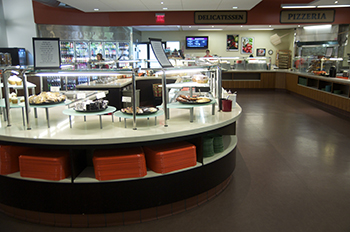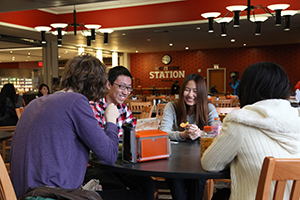Oregon State University Updates Arnold Dining Center
 CORVALLIS, Ore. — The redesigned Arnold Dining Center at Oregon State University in Corvallis, has generated almost $2 million in additional sales for the institution since its unveiling in 2011. The dining hall was initially constructed in 1973 for the residents of Finley and Bloss halls.
CORVALLIS, Ore. — The redesigned Arnold Dining Center at Oregon State University in Corvallis, has generated almost $2 million in additional sales for the institution since its unveiling in 2011. The dining hall was initially constructed in 1973 for the residents of Finley and Bloss halls.
The opening of the International Learning Center in 2011, however, quickly resulted in an overflow of traffic through the Arnold Center and demonstrated a need for a renovation in order to accommodate the increased flow of people and development of the institution.
The $4 million renovation included redesigning the servery section of the dining center, now called the Southside Station @ Arnold, to fuse global cuisine and the Pacific Northwest for a shared experience suitable for international and domestic patrons, according to Richard Turnbull, Associate Director of University Housing and Dining Services.
The project team included Nancy Kalter-Dills and Akiko K. Hrovat from EDG Interior Architecture + Design in San Rafael, Calif., Michael Shea and Andrew Burke from Portland, Ore.-based Soderstrom Architects Ltd., and foodservice consultants Steve Marshall and Mark Walsh from The Marshall Associates. Andersen Construction Company from Portland, with Ken Lewis as the project manager, oversaw the project’s construction.
The updated design features new lighting and a more efficient design suitable for increased traffic and more efficient operations. Additional elements include locally manufactured quartz countertops, flame-resistant fiber tape insulation that allows pans to be isolated from the countertops and large acoustic tiles in the ceiling to enhance the space’s aesthetics and design.
 The most notable feature of the Southside Station’s design is the overall efficiency introduced to the space. Nearly 70 percent of food production happens at the serving stations, and well-equipped workspaces allow staff to maximize their efficiency and minimize the amount of space necessary for production. Ample space in the back of the Southside Station allows staff to receive deliveries, store food and prepare food efficiently. The exhaust fans and hood systems in the back area were evaluated and updated to fit current codes.
The most notable feature of the Southside Station’s design is the overall efficiency introduced to the space. Nearly 70 percent of food production happens at the serving stations, and well-equipped workspaces allow staff to maximize their efficiency and minimize the amount of space necessary for production. Ample space in the back of the Southside Station allows staff to receive deliveries, store food and prepare food efficiently. The exhaust fans and hood systems in the back area were evaluated and updated to fit current codes.
The project team also took into account the varying tastes of the diverse student body with a wider selection of global cuisines. Individual stations serve a variety of food choices, including sushi, global cuisines, grilled selections, a deli, pizza and breakfast items.
The project was not LEED certified, but does comply with LEED Silver certifications, as required by the university for all campus projects. One element of this requirement is evident in the Southside Station’s center for recycling and composting, which provides the opportunity to separate trash and recyclables at the end of meals.
The enhanced design produced outstanding results as the annual customer count more than doubled from 145,000 to 300,000, and the sales for the year increased from $5.6 million to $7.3 million.
